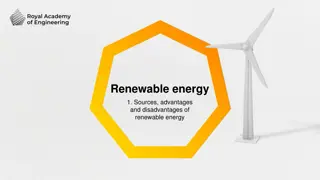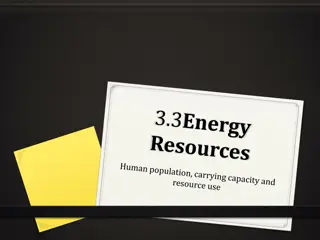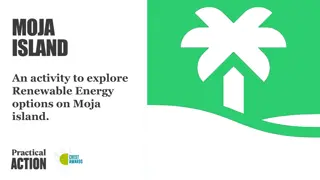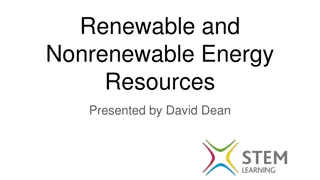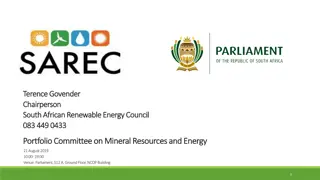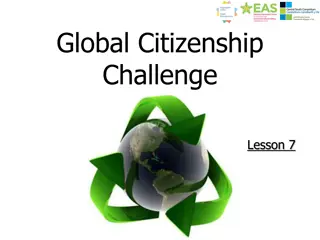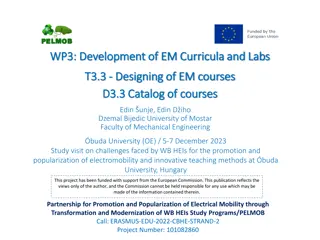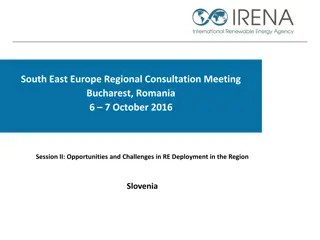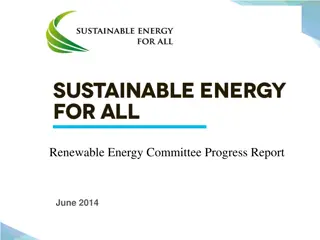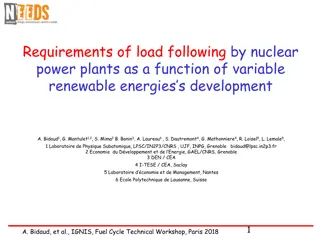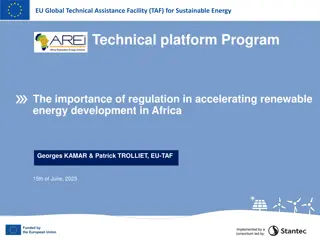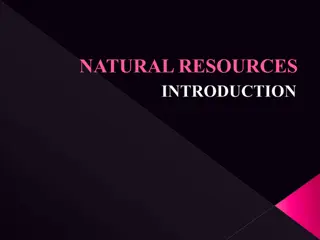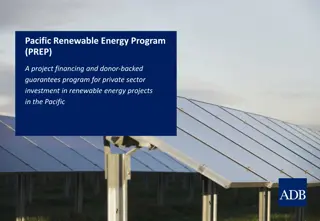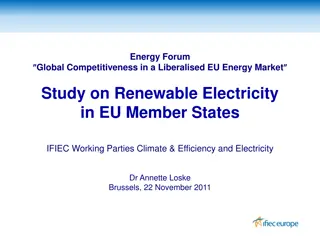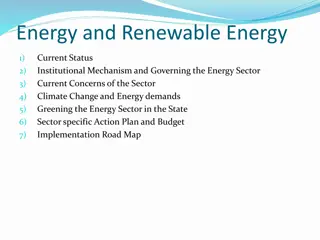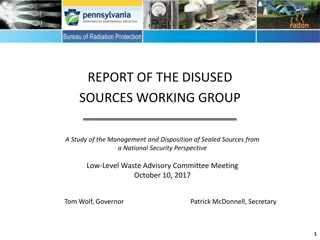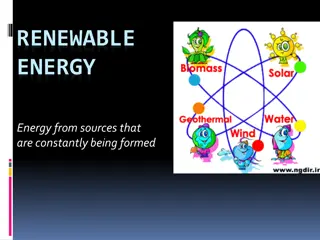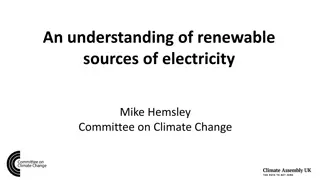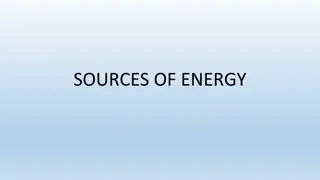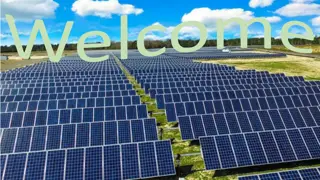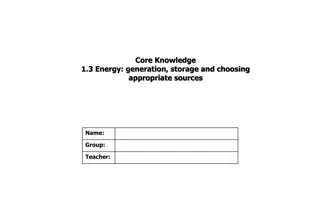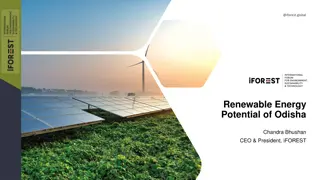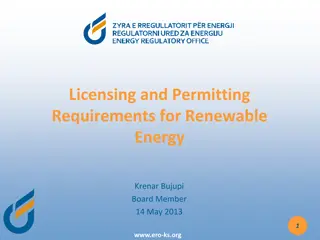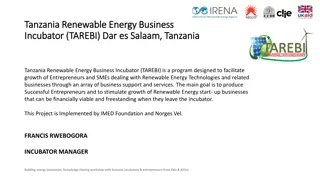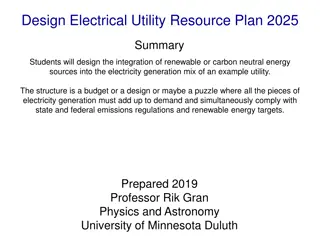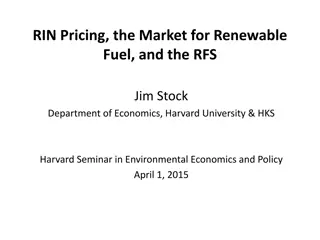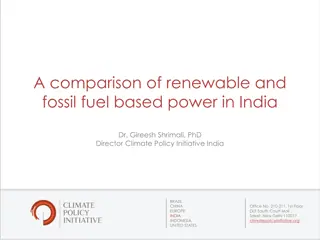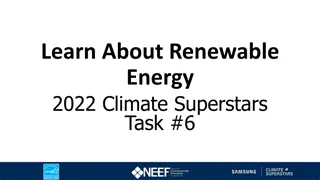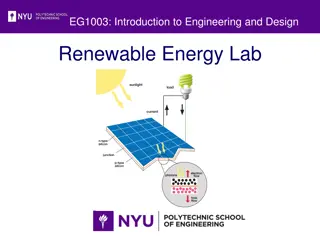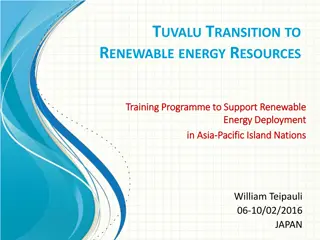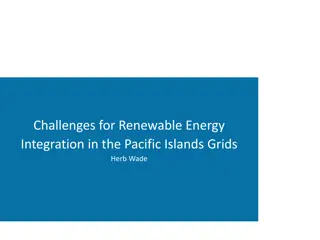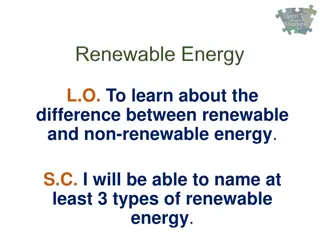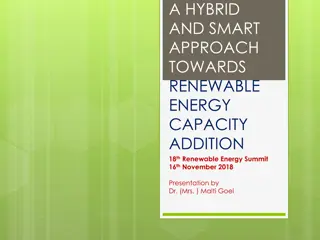Renewable Energy: Sources, Advantages, and Disadvantages
Explore the sources, benefits, and drawbacks of renewable energy, and learn about its impact on climate change. Discover how fossil fuels contribute to environmental issues and why transitioning to renewable energy is crucial for a sustainable future.
4 views • 14 slides
Renewable Energy Sources in English Lesson Plan for Class X
Senior Teacher Bijoy Chakraborty presents a detailed English lesson plan for Class X students at Ispahani Public School & College in Cumilla Cantonment. The lesson covers topics such as renewable energy sources, key vocabulary, and questions related to environmental issues and energy crisis, emphasi
8 views • 23 slides
Renewable Energy
These resources support practitioners in delivering renewable energy concepts for engineering and manufacturing qualifications at levels 2 and 3. Topics covered include sources of renewable energy, advantages and disadvantages, planning for renewable energy, delivery suggestions, energy calculations
5 views • 19 slides
Sources of Drugs and Their Origins
Drugs can be sourced from six major categories: plants, animals, minerals/earth, microbiological sources, semi-synthetic sources, synthetic sources, and recombinant DNA technology. Plant sources, being the oldest, provide various medicinal properties through leaves, flowers, fruits, seeds, roots, ba
1 views • 11 slides
Overview of Energy Resources: Renewable and Non-Renewable
Energy resources are classified into renewable and non-renewable types, with a mix of both used worldwide. Non-renewable resources dominate global energy consumption, with fossil fuels like oil, natural gas, coal, and nuclear energy being major sources. While non-renewable sources still dominate, ef
1 views • 20 slides
Renewable Energy Options on Moja Island
Explore the initiative on Moja Island to identify suitable renewable energy options for its communities, aiming to bridge the energy gap and improve lives. Join the task of suggesting renewable energy solutions for the four main communities on the island, guided by the belief that sustainable energy
0 views • 10 slides
Renewable and Nonrenewable Energy Resources
Delve into the world of renewable and nonrenewable energy resources with David Dean as your guide. Learn about the different types of energy sources, how they work, their advantages and disadvantages, and the importance of sustainable energy practices. Discover how electricity powers our daily lives
2 views • 10 slides
Advancing Renewable Energy in South Africa: SAREC Presentation Highlights
SAREC, the South African Renewable Energy Council, plays a vital role in promoting the renewable energy sector in South Africa. Their objectives include supporting a just energy transition, engaging with government, promoting excellence in renewable energy, and collaborating with various organizatio
4 views • 20 slides
Renewable Energy for a Sustainable Future
This lesson focuses on the importance of renewable energy in meeting future energy needs sustainably. Students discuss and differentiate between renewable and non-renewable energy sources, analyze energy generation in Wales, and make decisions on investing in renewable energy options. They also eval
0 views • 6 slides
Development of Electromobility Curriculum at Dzemal Bijedic University
Edin D.iho Dzemal Bijedic University at Mostar is actively involved in the promotion and modernization of electromobility through the development of innovative teaching methods and curricula. This project, funded by the European Commission under the PELMOB initiative, focuses on designing electromob
2 views • 19 slides
Accelerator Technology R&D Targets and Sources Overview
The SnowMass2021 Accelerator Frontier AF7 focuses on Accelerator Technology R&D, exploring targets and sources such as high brightness electron sources, muon sources, and high intensity ion sources. The community planning meeting discussed various Letter of Interest submissions outlining innovative
1 views • 7 slides
Renewable Energy Deployment in Slovenia: Achieving Targets and Overcoming Challenges
The content provides insights into Slovenia's progress in renewable energy deployment, focusing on achieving targets and combating challenges. It covers topics such as renewable energy targets, sectoral goals, RES utilization, and the role of various renewable sources in the country. Statistical dat
0 views • 19 slides
Renewable Energy Committee Progress Report June 2014
The Renewable Energy Committee Progress Report for June 2014 highlights the importance of renewable energy in the current economic and environmental landscape. It discusses trends, objectives, activities, and areas of focus related to renewable energy. The report underscores the global shift towards
1 views • 11 slides
Renewable Energy and Energy Efficiency in West Africa: Current Status and Future Prospects
The content discusses the vision, challenges, potentials, constraints, and establishment of the Economic Community for West African States (ECOWAS) Centre for Renewable Energy and Energy Efficiency (ECREEE) in West Africa. It highlights the region's significant renewable energy potentials, the barri
0 views • 10 slides
Geothermal Institute at University of Auckland - Advancing Renewable Energy Solutions
The Geothermal Institute at University of Auckland, led by Prof. Rosalind Archer, specializes in geoscience, reservoir engineering, and renewable energy technologies. Their research projects range from fundamental geoscience to societal implications in energy markets. The institute offers educationa
0 views • 13 slides
Load Following by Nuclear Power Plants in Relation to Variable Renewable Energies' Development
The study explores the requirements of load following by nuclear power plants in the context of variable renewable energies' growth. It discusses the impact of renewable energy development on nuclear economic models and the need for dispatchable capacities. Benchmarks are set to test robustness of d
0 views • 11 slides
Importance of Regulation in Accelerating Renewable Energy Development in Africa
The presentation discusses the significance of regulation in driving the development of renewable energy in Africa. It emphasizes key legal and regulatory requirements such as tariff principles, unbundling, incentives for renewable energy, competition, and transparent procedures. The need for sector
0 views • 22 slides
Natural Resources: Types and Conservation
Natural resources play a crucial role in sustaining life on Earth, encompassing elements like water, air, soil, minerals, and more. These resources can be classified into renewable and non-renewable categories, with the former being replenishable through natural cycles and the latter being finite an
0 views • 24 slides
Pacific Renewable Energy Program (PREP) Overview and Financing Details
The Pacific Renewable Energy Program (PREP) offers project financing and donor-backed guarantees to facilitate private sector investment in renewable energy projects in the Pacific region. By addressing short and long-term liquidity risks, PREP aims to attract investors to develop solar and wind pro
0 views • 4 slides
Analysis of Renewable Energy Policies in the Liberalised EU Energy Market
This study examines the global competitiveness of the energy forum in a liberalised EU energy market, focusing on renewable electricity in EU member states. It delves into the energy balance, political context regarding European climate targets, industry involvement, and the financial context of ren
0 views • 16 slides
Renewable Energy Status and Trends in Tamil Nadu: Challenges and Opportunities
Renewable energy accounts for a significant portion of Tamil Nadu's electricity grid capacity, with a focus on wind energy. Despite this, the actual energy generated from renewable sources remains low. The state faces challenges such as high electricity consumption, sector-wise variations, and trans
0 views • 18 slides
Disused Sources Working Group Report on National Security Perspective
The Disused Sources Working Group (DSWG) report focuses on managing and disposing of sealed sources to reduce national security risks. Formed in 2011, DSWG developed recommendations to enhance the management of disused sealed sources. The report categorizes sealed sources based on potential harm and
3 views • 15 slides
Renewable Energy Sources
Renewable energy is derived from constantly replenished sources such as solar power, wind power, biomass, hydroelectricity, and geothermal energy. These sustainable sources offer clean alternatives to traditional fossil fuels, contributing to a greener future. Solar energy utilizes the sun's power t
0 views • 16 slides
Renewable Sources of Electricity and the Need for System Flexibility
This content provides an overview of renewable electricity sources, including variable renewables and other types, their characteristics, current shares in the system, and the importance of system changes and flexibility to accommodate varying energy outputs. It discusses the status, potential scale
0 views • 9 slides
Different Sources of Energy
Exploring conventional and non-conventional sources of energy, this content discusses the characteristics of a good fuel source, such as high energy output and ease of availability. It delves into the distinction between renewable and non-renewable energy sources, highlighting fossil fuels as non-re
0 views • 22 slides
Renewable and Non-Renewable Energy Sources for Sustainable Living
Discover the diverse world of renewable and non-renewable energy sources with a focus on renewable energy for a sustainable future. Learn about geothermal power, solar power, wind power, tidal power, biomass power, and the advantages and disadvantages of non-renewable energy resources. Engage in dis
0 views • 16 slides
Energy: Sources, Generation, and Storage
Explore the fundamentals of energy sources, conversion methods, advantages, and disadvantages of non-renewable and renewable sources. Delve into topics such as coal, oil, gas, biomass, solar, wind, and more. Understand the National Grid, power systems, and considerations when selecting energy source
0 views • 6 slides
Renewable Energy Potential Assessment in Odisha by iFOREST
Odisha holds significant renewable energy potential, with assessed capacities in solar, biomass, and wind energy. The Odisha Renewable Energy Policy aims to decarbonize the energy sector by leveraging state renewable energy potential, leading to a reduction in CO2 emissions, job creation, and minima
0 views • 4 slides
Renewable Energy Licensing and Permitting Requirements Overview
Discover the institutional responsibilities and targets for renewable energy in a regulatory framework. Learn about feed-in tariffs, authorization procedures, and targets set for various renewable energy sources like hydro, wind, photovoltaic, and biomass. Explore the methodology and processes invol
0 views • 11 slides
Tanzania Renewable Energy Business Incubator Overview
Tanzania Renewable Energy Business Incubator (TAREBI) in Dar es Salaam aims to support entrepreneurs and SMEs in renewable energy technologies. The program provides business support, coaching, networking, and investment support to foster successful, financially viable renewable energy startups. IMED
1 views • 4 slides
Integrating Renewable Energy Sources for Minnesota Power Utility: A 2025 Plan
Students will design the integration of renewable or carbon-neutral energy sources into the electricity generation mix of Minnesota Power Utility to align with state and federal regulations. The plan involves transitioning from coal to hydro, wind, solar, natural gas, and purchased sources, with a f
0 views • 10 slides
RIN Pricing, Market Dynamics, and Policy Issues in Renewable Fuel Sector
The article discusses the Renewable Fuel Standard (RFS), Renewable Identification Numbers (RINs), RIN pricing fundamentals, pass-through effects, and policy implications in the renewable fuel market. It delves into legislative context, fuel categories, biofuels expansion, and a dynamic model of the
0 views • 37 slides
Comparative Analysis of Renewable vs. Fossil Fuel Power in India
The comparison between renewable and fossil fuel-based power in India reveals that the renewable energy sector has historically shown lower risk and higher returns than the fossil fuel sector. Investors perceive renewable energy investments to be less risky, with solar being seen as less risky than
0 views • 23 slides
Renewable Energy and its Benefits in 2022
Renewable energy sources like wind, waves, tides, sunlight, geothermal heat, and biomass play a crucial role in combating climate change by reducing greenhouse gas emissions. This task educates about the differences between renewable and non-renewable energy sources, the benefits of renewables, and
0 views • 10 slides
Analysis of Vermont's Renewable Energy Standard and REC System
This document presents an overview of Vermont's Renewable Energy Standard (RES) and Renewable Energy Credits (RECs) system. It covers the establishment of the RES, specific requirements, eligibility criteria for RECs, and the different tiers of the RES. Key topics include the projection of impacts,
0 views • 23 slides
Renewable Energy Lab: Exploring Solar, Wind, and Hydrogen Technologies
Explore the capabilities of solar panels, wind turbines, hydrogen fuel cells, and capacitors in this Renewable Energy Lab. Learn about the harnessed clean energy sources, including solar panels converting sunlight to electricity and wind turbine technology utilizing wind pressure. Design a renewable
0 views • 18 slides
Tuvalu Renewable Energy Transition Programme
Tuvalu is transitioning to renewable energy sources to support sustainable energy deployment in the Asia-Pacific region. With a focus on solar PV, wind, biodiesel, and energy efficiency, the government aims to achieve 100% renewable energy generation by 2020. The implementation strategy includes a m
1 views • 14 slides
Challenges in Integrating Renewable Energy in Pacific Islands Grids
Integrating renewable energy sources like solar, wind, wave, and tidal power into Pacific Islands grids presents challenges due to the variability and rates of change in power output. Solar energy, for example, is only available at certain times, and the load patterns need to be carefully considered
0 views • 18 slides
Renewable and Non-Renewable Energy Sources
Understanding the difference between renewable and non-renewable energy sources such as fossil fuels and renewable sources like biomass, hydro-electric, solar, wave, and wind energy. Learn how electricity is generated, the impact on the environment, and the benefits of using renewable energy. Discov
0 views • 15 slides
Innovations in Renewable Energy: A Smart Approach for Sustainable Future
Explore cutting-edge technologies like Floating Renewable Energy Platforms, Hybrid Energy Systems, Metal Air Batteries, and more, presented at the 18th Renewable Energy Summit. Learn about global renewable energy trends, India's capacity addition, and the potential for renewable power growth by 2030
0 views • 16 slides
